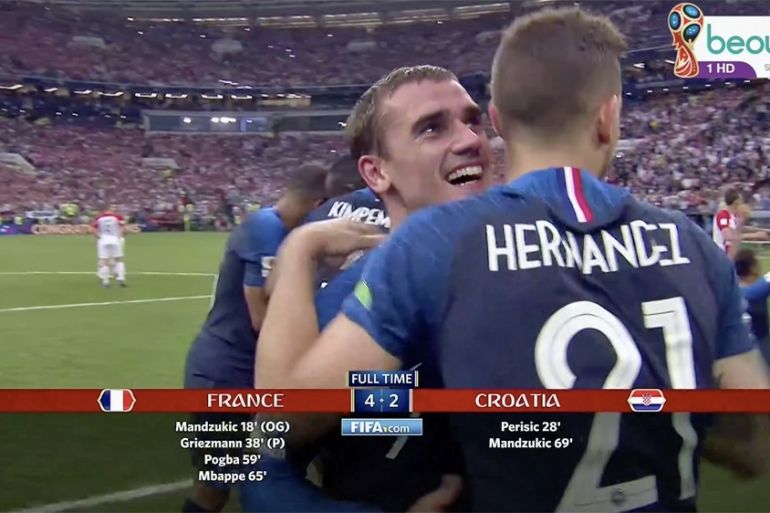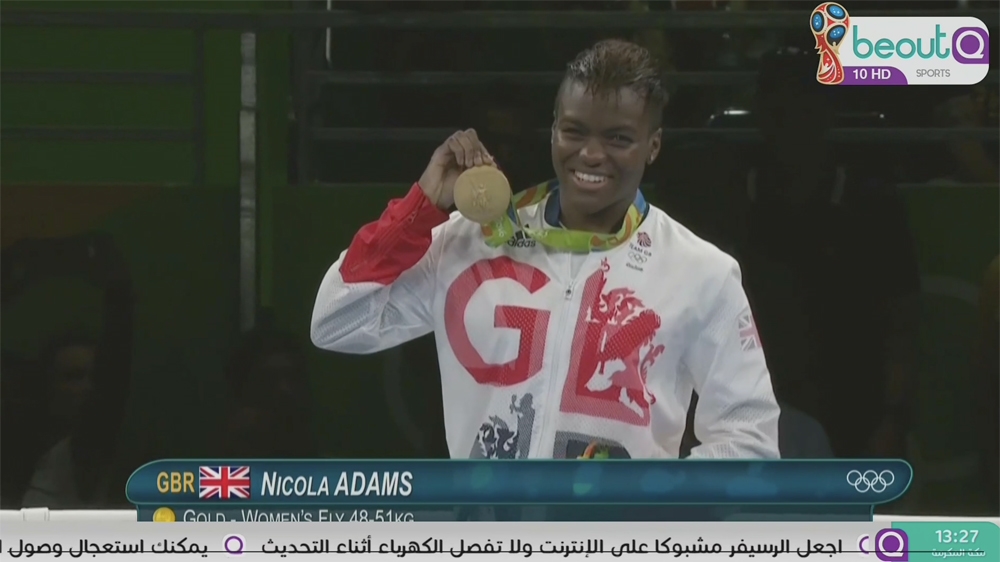Saudi state behind beoutQ piracy TV operation: WTO ruling
Saudi Arabia breached international law by actively supporting beoutQ pirate TV operation, landmark WTO verdict says.

Saudi Arabia has actively promoted and supported the beoutQ pirate TV operation and has breached its obligations under international law to protect intellectual property rights, the World Trade Organization (WTO) has ruled in a landmark verdict.
In its judgment, published on Tuesday, the WTO ruled that Saudi government officials and entities, including Saud Al-Qahtani, an aide to Saudi Crown Prince Mohammad bin Salman (MBS), publicly promoted beoutQ, including with governmental tweets.
Keep reading
list of 3 itemsHow Saudi piracy station beoutQ could sink Newcastle takeover bid
Asian Football Confederation steps up fight against beoutQ piracy
Qatari sport network beIN Media Group, which holds exclusive rights to broadcast international tournaments to the Middle East and North Africa (MENA) region and Europe, has long claimed beoutQ is stealing its signal and broadcasting it as its own.
BeoutQ began broadcasting after Saudi Arabia, the United Arab Emirates (UAE), Bahrain, and Egypt severed all ties with Qatar and imposed a land, sea, and air blockade against it in June 2017. The four countries accused Qatar of “supporting terrorism” and meddling in neighbouring countries’ affairs. Qatar rejected the allegations.
Shortly after the blockade was enforced, all beIN Sports channels were banned in the blockading nations and their equipment was confiscated in Saudi Arabia.
Damning insight
The WTO case, which was brought by Qatar, took a year and a half to conclude and offers a damning insight into Saudi Arabia’s efforts to undermine Qatari intellectual property rights.
The findings include that the Saudi state actively promoted and supported beoutQ from the beginning and even sponsored multiple public gatherings with beoutQ screenings, including during the FIFA World Cup 2018 when the Saudi government announced “294 public display screenings allocated across the 13 regions of Saudi Arabia broadcasting beoutQ; and – in addition – the Saudi State did not take any action whatsoever against beoutQ over the course of 3 years”, the WTO ruling said.

The WTO also found that beoutQ was hosted on frequencies transmitted by satellite provider Arabsat, an entity with a Saudi CEO, majority-owned by the Saudi government, with its headquarters in Riyadh.
The hosting was facilitated by Saudi Television Company LLC, the WTO said, endorsing a 2019 French court decision that definitively ruled that Arabsat carried beoutQ.
Arabsat, according to the WTO ruling, has ignored hundreds of take-down notices from the Premier League, FIFA, UEFA, beIN, and other broadcasters.
Saudi authorities also obstructed the initiation of civil copyright infringement cases, including by pressuring nine Saudi law firms to refuse to take on such civil action by the Premier League and others, according to the verdict.
‘Major victory’
Qatar welcomed the WTO ruling, describing it as a “resounding victory”.
“Saudi Arabia, especially since it is hosting the upcoming G20, to respect this decisive ruling and end the theft and piracy of IP rights at once,” said Ali bin Ahmed Al Kuwari, Qatar’s minister of commerce and industry. “They can start by heeding the WTO’s ruling and conducting a fair, timely, and transparent legal proceeding against the perpetrators in order to stop this abuse post-haste,” he added.
David Sugden, legal counsel for beIN Media Group, also described the judgement as a “major victory” for intellectual property (IP) rights protection and the international rule of law.
“Fundamentally, sport relies on the protection of IP and international law and local law to protect its interests, and sadly for three years now every sports body’s rights have been run roughshod over by Saudi Arabia and this judgment emphatically says that,” he told Al Jazeera from London.
World Trade Organization rules, in a landmark verdict, that Saudi Arabia has actively promoted and supported the pirate TV operation, beoutQ.
Read more: https://t.co/uUjhBf5guw pic.twitter.com/b2aiGGnbGq
— Al Jazeera English (@AJEnglish) June 16, 2020
UEFA said it also welcomed the WTO’s ruling and its conclusions. “What is clear is that beoutQ’s broadcasts constitute piracy of UEFA’s matches and as such, are illegal,” it said in a statement, adding that the verdict”shows clearly that no-one involved in audio-visual piracy should consider themselves above the rule of law”.
Meanwhile, Saudi Arabia said anyone committing acts of piracy is not inside the kingdom.
“Saudi Arabia has a strong record of protecting intellectual property and is committed to applying its national law and procedures in full conformity with WTO rules,” read a statement carried by its state news agency SPA.
Separate to the WTO case, beIN Media Group has brought an arbitration case against Saudi Arabia, seeking $1bn in damages accumulated since 2018 for a range of Saudi actions targeting beIN, including beoutQ.
Like with the WTO case, beIN was forced to bring costly and slow proceedings under international law in order to have its claims against Saudi Arabia heard, given the Saudi courts have been blocked by Saudi Arabia.
The beIN arbitration claim was filed on October 1, 2018, and a ruling is some time away, but another major ruling against Saudi Arabia is expected in the investment arbitration, much like the WTO verdict.

‘National security’
Saudi Arabia had for years maintained that beoutQ was a rogue operation with no state involvement.
However, its defence in the WTO case cited protection of its “national security” as justification for its violations of intellectual property rights, an argument that was thrown out by the WTO.
The WTO permitted Saudi Arabia to invoke national security to the justify violation of two articles of the organisation’s foundational agreement, saying Saudi Arabia only needed to demonstrate “a minimum requirement of plausibility” when showing a connection between its “security interests” and its violations of WTO law. However, the verdict continued that all the factual findings still stand despite this.
The WTO called on Saudi Arabia to stop its violation of valuable intellectual property rights.
The verdict comes as Saudi Arabia seeks to play an increasingly larger role in the world of sports and entertainment, including through investments in football clubs – all of which, the WTO pointed out, is predicated on the protection of intellectual property.
The Saudi Arabia Public Investment Fund (PIF) has for months been trying to buy Premier League club Newcastle United. It is not yet clear how the WTO verdict will affect this bid.